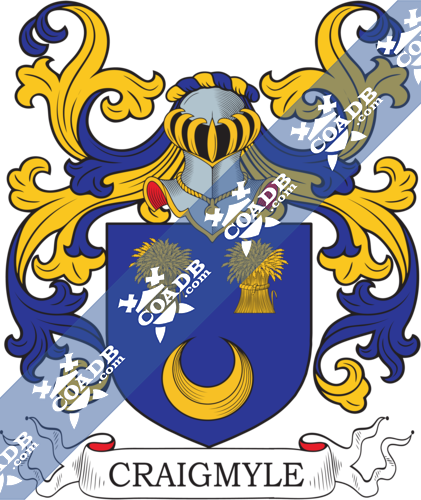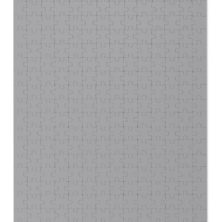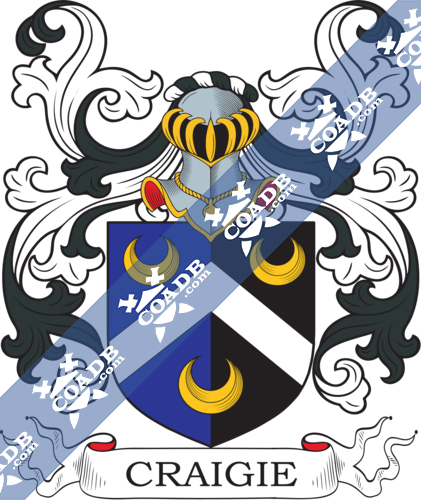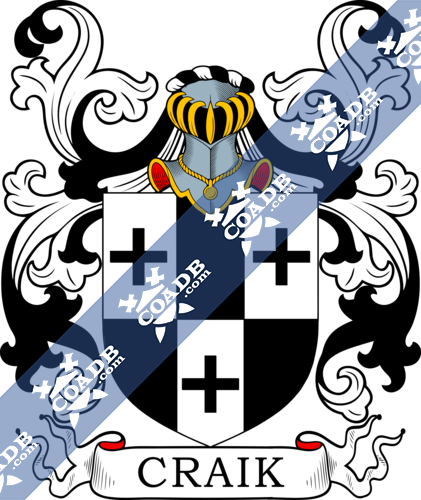Craigmyle Family Crest, Coat of Arms and Name History

Craigmyle Coat of Arms Gallery
Don’t know which Coat of Arms is yours?
We can do a genealogical research. Find out the exact history of your family!
Learn MoreCraigmyle Origin:
Scotland
Origins of Craigmyle:
This interesting Scottish name is of geographical origin from the place so called in the church of Kincardine-O’Neil, Aberdeenshire and means the “mill by the Craig, a rocky hill,” from the Gaelic “Creag” borrowed from the old English “Creag(g).” During the Middle Ages, when migration from the country to the town was becoming more famous, people picked their original placename as a source of classification. One Andrew Craigmyle seized in 1626 in Aberdeenshire “For absence from the Wapinshaw” (a meeting of Clansmen to show weapons).
Variations:
More common variations are: Cragmyle, Craigmile, Craigmyli, Cragmyl, Crigmile, Cragmile, Creagmile, Creagmile, Creigmile, Craigmill, Craggmile.
Scotland:
The surname Craigmyle first appeared in Stirlingshire, where they held a family seat from very ancient times. Some say well before the Norman Invasion and the arrival of Duke William at Hastings in 1066 AD.
The very first recording spelling of the family was shown to be that of Elspett Cragmyll, dated about 1570, in the “Council Register of Aberdeen.” It was during the time of King James VI of Scotland, dated 1567 – 1625. The origin of surnames during this period became a necessity with the introduction of personal taxation.
Ireland:
Many of the people with surname Craigmyle had moved to Ireland during the 17th century.
Here is the population distribution of the last name Craigmyle: United States 269; Scotland 118; Canada 44; England 43; Singapore 1
Notable People:
Peter Craigmyle (born 1 January 1894) was a Scottish football coach. He was born in Oldmeldrum, Scotland, the son of Peter William Craigmyle and Isabella Barclay Craigmyle, née McWilliam. After breaking both his legs in 1918, he took up soccer refereeing. He refereed almost every senior cup final in Britain at some point, as well as many Old Firm matches. He is famous to have managed international matches during the time from 1924 to 1946. In the 1920s, he had a weekly program on a local radio station 2BD. He traveled the world lecturing and refereeing, and became known as the “fearless Aberdonian.” In January 1950, he was offered with a silver inkwell by the Malta Football Association, for services to Maltese football. He next had a sports shop on King Street, Aberdeen. He was also a keen bowls player and was director of some bowls clubs in Aberdeen. During World War II, he directed and produced shows at Aberdeen Garrison Theatre and ran classical music concerts at the Cowdray Hall, Aberdeen.
Bessie Craigmyle (1863–1933) was a Scottish poet who resided in Aberdeen. She was the daughter of an elderly schoolmaster, who resigned when she was still a child. She was able to give her energies to her education, giving an extensive library and some greenhouses in the family home for her use. After qualifying as a school teacher, she was considered in the Dr. Williams School, Dolgellau, which was a pioneering secondary school for girls.
Baron Craigmyle, of Craigmyle in the division of Aberdeen, is a title in the Peerage of the United Kingdom. It was formed in May 1929 for the Liberal leader and judge Thomas Shaw, Baron Shaw. He had already in 1909 been given a life peerage under the Appellate Jurisdiction Act 1876 as Baron Shaw, of Dunfermline in the Division of Fife.
Blazons & Genealogy Notes
(Craigmyle, co. Aberdeen). Az. in chief two garbs, in base a crescent or.







